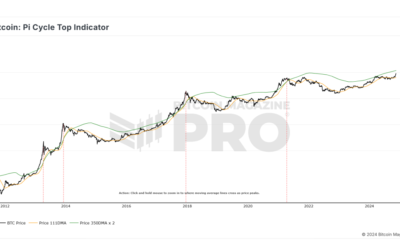crime
Telegram is a hotspot for crypto fraud and laundering
Published
2 months agoon
By
admin

A recent United Nations report showed that criminal networks in Southeast Asia are increasingly using the messaging app Telegram to facilitate illicit activities, ranging from trading hacked data to laundering money through unlicensed cryptocurrency exchanges.
The UN Office for Drugs and Crime found that organized crime syndicates are exploiting Telegram’s loose moderation and encrypted messaging features to carry out large-scale illegal operations. The UN’s findings, as reported by Reuters, highlight the vast scale of cybercrime and money laundering on the platform.
Criminals use the app to trade sensitive information, including credit card details and passwords, while purchasing tools like malware to steal funds via the messaging app.
According to the report, unlicensed crypto exchanges advertised on the app offer services that enable money laundering for criminal organizations.
Telegram’s role Southeast Asian crime
The report focuses on Southeast Asia, where Chinese crime syndicates operate billion-dollar fraud schemes. According to the UNODC, these operations generate between $27.4 billion and $36.5 billion annually.
The report cites one example of a group advertising that it can move $3 million worth of stolen Tether (USDT) per day.
Last week, Vietnamese police dismantled an international crypto fraud network operating from Laos’ Golden Triangle Special Economic Zone, arresting five suspects. The scammers swindled over 17.6 billion VND through fake romantic relationships and fraudulent investments on a platform called “Biconomynft.”
Telegram’s dance with law enforcement
Telegram has close to 1 billion users, but its founder, Pavel Durov, has come under recent scrutiny. In August, Durov was arrested in Paris, charged with allowing the platform to facilitate criminal activities, including the distribution of child sexual images.
This has sparked debates about messaging platforms’ responsibility to prevent criminal activity while balancing users’ privacy rights.
For those unfamiliar with crypto, platforms like Telegram play a key role in enabling encrypted communication but can also be misused. Criminals can exploit assets to move funds quickly and anonymously, making it difficult for authorities to track the flow of illegal money.
After his arrest, Durov announced updates to the platform’s moderation policies in response to concerns over the misuse of its search functionality. He stated that Telegram may disclose the IP addresses and phone numbers of rule violators to authorities following valid legal requests.
Source link
You may like


The Bitcoin Pi Cycle Top Indicator: How to Accurately Time Market Cycle Peaks


Bitcoin Approaches $100K; Retail Investors Stay Steady


Solana Hits New ATH On Huge Whale Accumulation, More Gains Ahead?


Microsoft Should Buy $78 Billion Worth of Bitcoin


Ethereum Believers May Be Staring Down Opportunity As ETH Reaches Another Low Against Bitcoin: CryptoQuant CEO


UK government is ready for crypto regulations next year
Canada
Crypto influencer Kevin Mirshahi found dead in Canadian park
Published
1 week agoon
November 14, 2024By
admin

The body of Kevin Mirshahi, a 25-year-old cryptocurrency influencer who had been missing since June, was found dead.
Mirshahi’s body was discovered in Montreal’s Île-de-la-Visitation Park, as confirmed by the Sûreté du Québec, according to the Montreal Gazette.
A passerby came across his decomposing body, prompting an investigation that identified him through an autopsy.
The case, which marks Montreal’s 32nd homicide of 2024, has highlighted a concerning pattern of violence within the crypto community, raising questions about the safety of high-profile figures in the sector.
Timeline of Mirshahi’s disappearance and death
Mirshahi’s disappearance occurred on June 21. Early that morning, he and three others were allegedly abducted from a condo building in Old Montreal.
Montreal police were alerted after receiving a 911 call about a disturbance at a residence near de la Commune and St-Hubert Streets, according to The Gazette.
CRYPTO INFLUENCER FOUND DEAD
Kevin Mirshahi, a Montreal crypto influencer, was discovered in Île-de-la-Visitation park months after a June abduction.
A 32-year-old woman’s facing murder charges, but no ties to his crypto firm “Crypto Paradise Island” confirmed.
Mirshahi’s… pic.twitter.com/tgVq43uwN9
— Mario Nawfal’s Roundtable (@RoundtableSpace) November 14, 2024
While the three other abductees were quickly located, Mirshahi remained missing, prompting police to escalate the investigation to the SQ.
During the initial investigation, police identified Joanie Lepage, a 32-year-old woman from Les Cèdres, Quebec, as a suspect, per The Gazette.
In August, she was arrested and charged with first-degree murder and involvement in Mirshahi’s abduction. Authorities allege that Lepage played a role in concealing Mirshahi’s death, though investigations are ongoing to determine if other suspects may have been involved.
Mirshahi’s background in crypto
Mirshahi was a prominent figure in Montreal’s cryptocurrency scene, primarily due to his management of a private investment firm called “Crypto Paradise Island,” per The Gazette.
His activities in the crypto space attracted public and regulatory scrutiny, particularly from Quebec’s investment authority, the Autorité des Marchés Financiers.
The AMF placed restrictions on Mirshahi in 2021, barring him and two associates from acting as investment advisers or conducting securities transactions. Two weeks after his disappearance, this ban was reinforced in July 2024, limiting his online activities and requiring him to cease promoting related content on social media.
This case isn’t the first crypto-related crime that happened in Canada this month. On Nov. 6, Toronto police investigated the kidnapping of WonderFi CEO Dean Skurka, who was abducted in downtown Toronto and released after a $1 million ransom was paid electronically.
Source link
crime
Tether helps Canadian police recover stolen crypto
Published
2 weeks agoon
November 9, 2024By
admin

Tether recently assisted the Ontario Provincial Police in recovering $10,000 CAD worth of stolen cryptocurrency.
This recovery was achieved through Tether’s collaboration with the OPP’s Cyber Investigations Team, showcasing the company’s commitment to supporting law enforcement in combating cybercrime.
Tether responded to the OPP’s request by freezing the Tether (USDT) involved in the theft, which allowed the digital assets to be returned to their rightful owner.
Detective Staff Sergeant Addison Hunter of the OPP acknowledged Tether’s voluntary cooperation as essential in recovering the stolen funds, according to Tether’s press release.
Tether has established itself as a partner to law enforcement in tackling cybercrime, claiming it has aided over 195 law enforcement agencies across 48 countries.
Tether also announced on November 8 that it had completed its first funding transaction in a Middle East crude oil investment, expanding the company’s ventures beyond just crypto.
Tether in the hot seat?
Recently, on the United States legal front, Tether denied reports that the company was under investigation for anti-money-laundering and sanctions law violations.
Manhattan prosecutors were reportedly investigating whether Tether’s cryptocurrency had been involved in illegal activities. The U.S. Treasury Department was also said to be considering sanctions on Tether, which could potentially limit American business dealings with the company.
Ceo Paolo Ardoino rejected these claims on X, asserting there was no indication of an investigation and calling the reports “old noise.”
Source link
crime
Nic Carter slams Minneapolis Fed President for saying crypto is ‘almost never’ used outside of criminal activity
Published
1 month agoon
October 22, 2024By
admin

Venture Capitalist Nic Carter criticizes Minneapolis Federal Reserve President Neel Kashkari for his remarks on how crypto is “almost never” used outside of illicit activity, even though the data tells a different story.
In an X post on Oct. 22, Nic Carter wrote “being this wrong should be illegal” in response to Neel Kashkari’s remarks about cryptocurrency being mostly used for illegal activities. He viewed Kashkari’s comments as unfortunate, as he is one of the top ten most important financial regulators on the planet.
Carter followed up his post by linking several data sources that disprove Kashkari’s assumption, including a report from blockchain data firm Chainalysis that found only 0.34% of all crypto transactions in 2023 had connections to illegal activity.
The report revealed that illicit transactions in crypto peaked in 2019 at just 1.29%.
At a Wisconsin Town Hall event hosted by the Chippewa Falls Area Chamber of Commerce on Oct. 21, Minneapolis Fed President, Neel Kashkari, claimed that “very few transactions were actually happening” in crypto.
“They’re not paying for goods and services using crypto. It almost never happens unless people are buying drugs or other illegal activities,” said Kashkari.
A recent study by Crypto ISAC revealed that cash remains the preferred criminal’s financial tool for criminal activities. Although cryptocurrencies have been linked to number of high-profile crimes, including exchange collapses and thefts, the actual portion is still significantly small.
Though it is difficult to track the exact amount of illicit activity in the traditional finance space, Crypto ISAC notes that the estimated amount of money laundered globally in one year is 2% to 5% of global GDP, which ranges between $800 billion to $2 trillion.
Out of that total number, only 0.34% of the transaction volume consists of cryptocurrencies. The U.S. Treasury also echoed these findings, stating that cash continues to be the primary preferred method for money laundering because of its anonymity, stability, and ubiquity.
Kashkari’s stance on cryptocurrency has remained the same in the past few years. In Feb. 2024, Kashkari said that Bitcoin(BTC) is a risky asset with no practical use in real economic scenarios, further questioning the cryptocurrency’s ability to be an effective hedge against inflation.
On Oct. 17, the Minneapolis Fed published a paper urging governments to either ban Bitcoin or enact a Bitcoin tax if they want to maintain their permanent primary deficits.
Source link

The Bitcoin Pi Cycle Top Indicator: How to Accurately Time Market Cycle Peaks
Bitcoin Breakout At $93,257 Barrier Fuels Bullish Optimism

Bitcoin Approaches $100K; Retail Investors Stay Steady

Solana Hits New ATH On Huge Whale Accumulation, More Gains Ahead?

Microsoft Should Buy $78 Billion Worth of Bitcoin

Ethereum Believers May Be Staring Down Opportunity As ETH Reaches Another Low Against Bitcoin: CryptoQuant CEO

UK government is ready for crypto regulations next year

“Crypto Dad” Chris Giancarlo Emerges Top For White House Crypto Czar Role

Bitcoin Nears $100,000 As Trump Council Expected To Implement BTC Reserve

Know Your Missiles: Russia’s Experimental Hypersonic Missile Is A New Kind of Killing Machine

Polkadot investor predicts a 30,000% rally for this $0.04 token by 2025

Donald Trump Proposed Crypto Advisory Council To Set Up Strategic Bitcoin Reserve

Want Greater Bitcoin Adoption? Engage With Your Government.

Why the Media Loves the Worst of Crypto

HashCats prepares for Token Generation Event after completing mining season
182267361726451435

Top Crypto News Headlines of The Week

Why Did Trump Change His Mind on Bitcoin?

New U.S. president must bring clarity to crypto regulation, analyst says

Ethereum, Solana touch key levels as Bitcoin spikes

Bitcoin Open-Source Development Takes The Stage In Nashville

Will XRP Price Defend $0.5 Support If SEC Decides to Appeal?

Bitcoin 20% Surge In 3 Weeks Teases Record-Breaking Potential

Ethereum Crash A Buying Opportunity? This Whale Thinks So

Shiba Inu Price Slips 4% as 3500% Burn Rate Surge Fails to Halt Correction

‘Hamster Kombat’ Airdrop Delayed as Pre-Market Trading for Telegram Game Expands

Washington financial watchdog warns of scam involving fake crypto ‘professors’

Citigroup Executive Steps Down To Explore Crypto
Mostbet Güvenilir Mi – Casino Bonus 2024

Bitcoin flashes indicator that often precedes higher prices: CryptoQuant
Trending

 2 months ago
2 months ago182267361726451435

 24/7 Cryptocurrency News3 months ago
24/7 Cryptocurrency News3 months agoTop Crypto News Headlines of The Week

 Donald Trump4 months ago
Donald Trump4 months agoWhy Did Trump Change His Mind on Bitcoin?

 News3 months ago
News3 months agoNew U.S. president must bring clarity to crypto regulation, analyst says

 Bitcoin4 months ago
Bitcoin4 months agoEthereum, Solana touch key levels as Bitcoin spikes

 Opinion4 months ago
Opinion4 months agoBitcoin Open-Source Development Takes The Stage In Nashville

 Price analysis3 months ago
Price analysis3 months agoWill XRP Price Defend $0.5 Support If SEC Decides to Appeal?

 Bitcoin4 months ago
Bitcoin4 months agoBitcoin 20% Surge In 3 Weeks Teases Record-Breaking Potential


